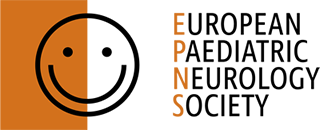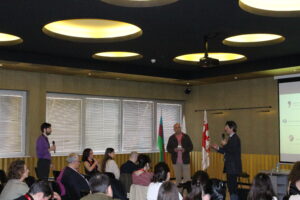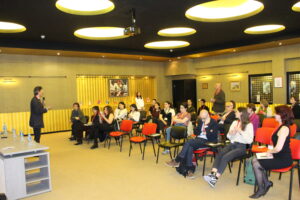The concept of the EPNS Visiting Teacher initiative: A volunteer professor / senior/ distinguished member of the EPNS, from Europe who is a recognised expert in a certain field, visits a nominated host centre in a country in Europe which is classified by the World Bank per capita income group 1, 2 or 3, or EPNS category WB4B (email info@epns.info for clarification) for a short stay of intense teaching. Travel and stay will be supported by EPNS. It may be considered that these visits will take place annually thereafter, if the first visit proves to be a success.
Thank you to all our applicants and we are delighted to announce the EPNS will be supporting the following in 2025:
- EPNS Visiting Teacher Pasquale Striano will visit Georgia 27 April – 1 May 2025
- EPNS Visiting Teacher Manoëlle Kossorotoff will visit Romania 9 – 11 October 2025
We are delighted to share the following reports from the 2025 Visiting Teachers:
- EPNS Visiting Teacher Pasquale Striano visited Georgia
Report on the EPNS-Supported Teaching Conference
“From Genetic Testing to Targeted Disease Management in Pediatric Epilepsies”
April 27–29, 2025 | Tbilisi, Georgia
With the generous support of the EPNS Visiting Teacher Programme, we held a three-day teaching conference titled “From Genetic Testing to Targeted Disease Management in Pediatric Epilepsies” at Mediclub Georgia Medical Center in Tbilisi. The event welcomed around 30 participants, including pediatric neurologists, residents, and medical students, and created a lively space for learning, sharing, and exchanging ideas.
We were honored to host Professor Pasquale Striano (IRCCS Gaslini Children’s Hospital, University of Genoa, Italy) as our Visiting Teacher. His presence and teaching truly shaped the atmosphere of the entire conference. On the first day, we explored how epilepsy diagnostics have evolved over time and looked closely at modern genetic testing tools, from chromosomal microarrays to whole genome sequencing. The sessions also included practical guidance on variant interpretation and how to make sense of online resources in everyday practice.
The second day focused on genetic epilepsies and ion channel disorders. Through case discussions and clinical examples, Professor Striano brought clarity to complex topics like sodium and calcium channelopathies and their treatment. These sessions were both informative and highly engaging.
On the final day, we looked ahead to what’s coming next in the field. Professor Striano introduced exciting international initiatives such as NETRE and Epi25, and we exchanged ideas about future collaborations, including work on microbiota and gene-targeted therapies.
Participants described the event as inspiring, clinically useful, and motivating. The open, collegial environment and the chance to learn directly from an expert were deeply appreciated. We are sincerely grateful to EPNS and to Professor Striano for making this valuable experience possible.
Report written by Melikishvili Gia MD


